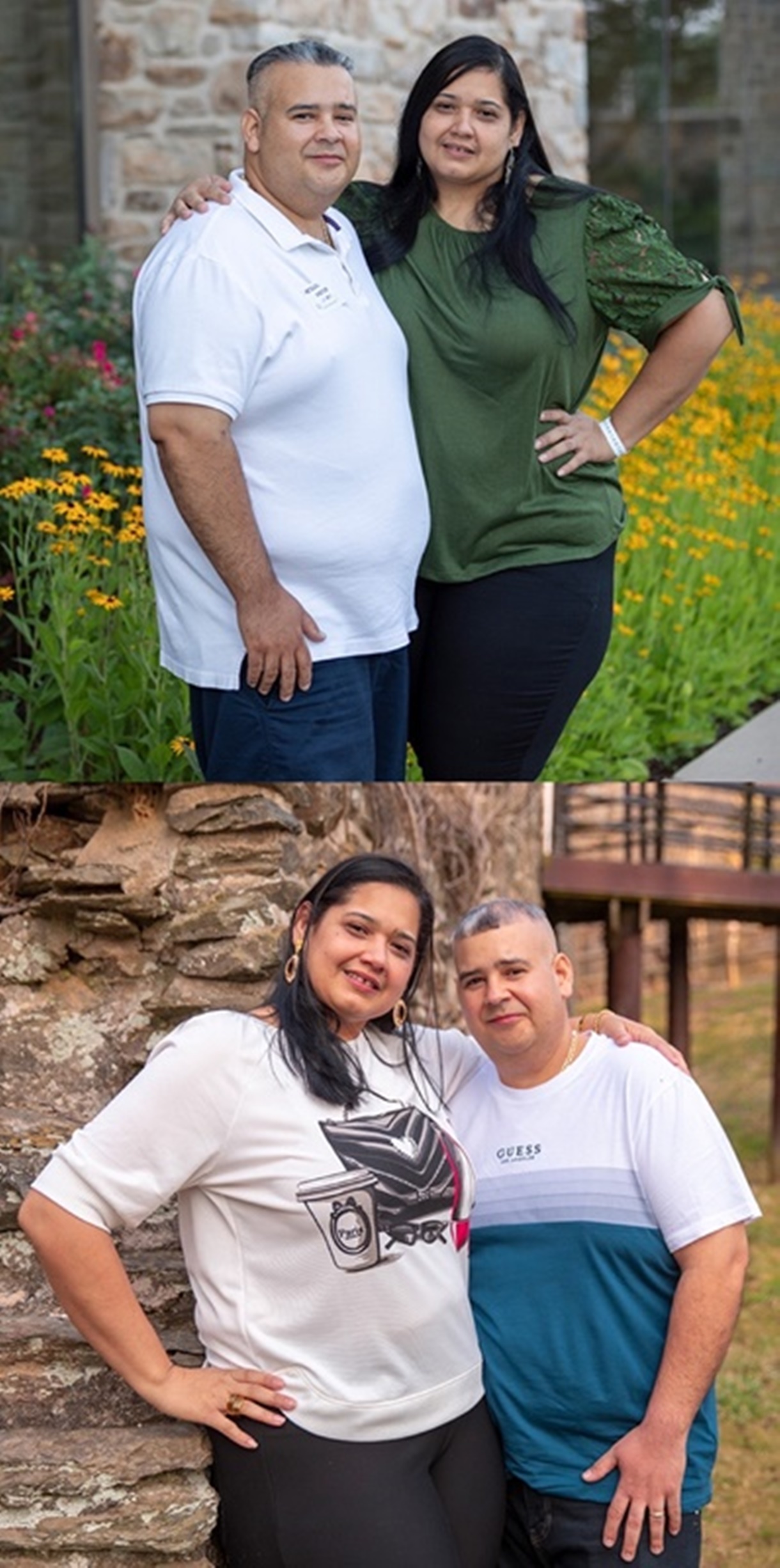Diana's and Aumary's Weight Loss Surgery Story
May 12, 2022
Categories: Patient Stories, Weight Loss
After Losing 100 Pounds Each, Diana and Amaury Have a Fresh Start
Diana and Amaury Perez didn’t have weight problems growing up. But at age 37 and 41, respectively, they were struggling with the scale. They tried dieting, exercise and weight-loss pills, but nothing worked for long.
Diana discovered she had a thyroid condition that slowed down her metabolism and her weight loss. When she stopped taking the medication, she continued to gain weight. “I was afraid of getting diabetes, high blood pressure and more health problems,” said Diana, who already had sleep apnea and osteoarthritis. At her highest point, she weighed 345 pounds.
Amaury did develop high cholesterol and blood pressure in addition to sleep apnea and nonalcoholic fatty liver disease, now the second leading cause of liver transplants. “I ate a lot due to anxiety and had a hard time losing weight,” he said. “At 333 pounds, I couldn’t live life normally. I was limited in what I could do because of weight.”
 The couple contacted Joseph Greene, MD, MBA, FACS, medical director, Bariatric Surgery program, Holy Cross Germantown Hospital, who had done weight-loss surgery for two people they know, including Amaury’s brother. “We decided that surgery could give us a fresh start — and we wanted to do it together for support,” said Amaury.
The couple contacted Joseph Greene, MD, MBA, FACS, medical director, Bariatric Surgery program, Holy Cross Germantown Hospital, who had done weight-loss surgery for two people they know, including Amaury’s brother. “We decided that surgery could give us a fresh start — and we wanted to do it together for support,” said Amaury.
Last July, Dr. Greene performed a robotic sleeve gastrectomy for Amaury and Diana two weeks apart at Holy Cross Germantown Hospital. In this minimally invasive procedure, 75 percent of the stomach is removed, creating a sleeve shape and allowing patients to feel full after eating less.
Over seven months, they lost 100 pounds each. “I’m very grateful I can do things like tie my shoes. Now I feel motivated to go to the gym,” Amaury said. “I’m so happy that I can wear heels again. And I can run,” added Diana. But most significant are the health benefits they’ve seen. Neither needs to sleep with a CPAP machine now. Diana’s health issues have resolved and Amaury’s cholesterol and blood pressure are normal.
“Weight-loss surgery is about more than losing pounds,” Dr. Greene said. “We treat obesity as a chronic disease. We are changing how the body’s metabolism functions,” he said. “Surgery is only one day of a patient’s life.
Nutrition and regular physical activity are principles they will practice every day to make long-term lifestyle changes.”
Holy Cross Health has a comprehensive bariatric surgery program with a team of expert surgeons who perform a range of weight-loss procedures, including revision surgery. Patients receive long-term, ongoing post-operative support from their surgeon, nurses and nutritionists, plus access to education before, during and after surgery, including information sessions, nutrition and fitness programs, support groups and regular checkups to monitor overall health.
“It’s amazing to watch patients come off insulin, stop using CPAP machines, see their joints get better — all of these conditions can be vastly improved, and may entirely go away after weight-loss surgery,” Dr. Greene said. “Now, instead of taking a lot of medications every morning, they’re only taking vitamins and saying, ‘It’s the best I’ve ever felt.’”
Still, weight-loss surgery should not be viewed as a last resort or an easy out. “It’s about taking control of your life,” Dr. Greene said. “Whatever their age, my patients always say, ‘I should have done this sooner.’ For people in their 20s, weight-loss surgery can increase fertility. We also help put diabetes in remission.”
When performed by a bariatric surgeon, weight-loss surgery has a lower complication rate than gallbladder surgery, according to Dr. Greene. “The da Vinci® Xi Surgical System available at Holy Cross Germantown Hospital and Holy Cross Hospital has significantly advanced my ability to do bariatric surgery, from a technical and outcome standpoint,” he added. “Robotic surgery requires fewer and smaller incisions and increases the ability to perform more complicated operations safely and accurately.”
What’s more, fewer incisions mean less pain and a shorter recovery. Diana and Amaury spent only one night in Holy Cross Germantown Hospital — an experience they ranked as a “10 out of 10.” Within three weeks, they were back at work.
